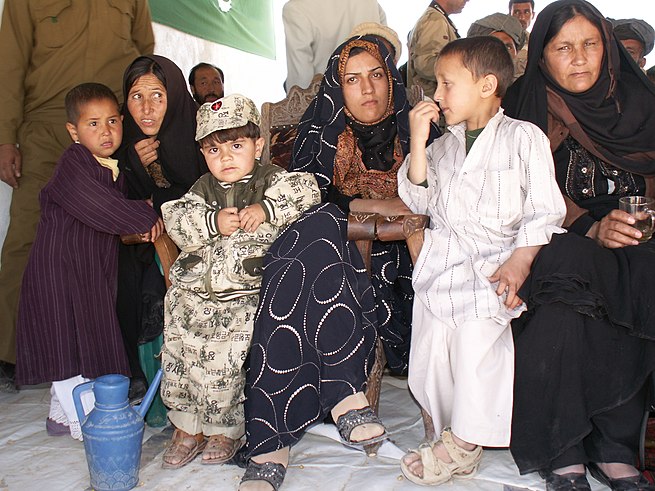
-
Kinship
In anthropology, kinship is the web of social relationships that form an important part of the lives of all humans in all societies, although its exact meanings even within this discipline are often debated. Anthropologist Robin Fox states that “the study of kinship is the study of what man does with these basic facts of life – mating, gestation, parenthood, socialization, siblingship etc.” Human society is unique, he argues, in that we are “working with the same raw material as exists in the animal world, but [we] can conceptualize and categorize it to serve social ends.” These social ends include the socialization of children and the formation of basic economic, political and religious groups.
Kinship can refer both to the patterns of social relationships themselves, or it can refer to the study of the patterns of social relationships in one or more human cultures (i.e. kinship studies). Over its history, anthropology has developed a number of related concepts and terms in the study of kinship, such as descent, descent group, lineage, affinity/affine, consanguinity/cognate and fictive kinship. Further, even within these two broad usages of the term, there are different theoretical approaches.
Broadly, kinship patterns may be considered to include people related by both descent – i.e. social relations during development – and by marriage. Human kinship relations through marriage are commonly called “affinity” in contrast to the relationships that arise in one’s group of origin, which may be called one’s descent group. In some cultures, kinship relationships may be considered to extend out to people an individual has economic or political relationships with, or other forms of social connections. Within a culture, some descent groups may be considered to lead back to gods or animal ancestors (totems). This may be conceived of on a more or less literal basis.
Kinship can also refer to a principle by which individuals or groups of individuals are organized into social groups, roles, categories and genealogy by means of kinship terminologies. Family relations can be represented concretely (mother, brother, grandfather) or abstractly by degrees of relationship (kinship distance). A relationship may be relative (e.g. a father in relation to a child) or reflect an absolute (e.g. the difference between a mother and a childless woman). Degrees of relationship are not identical to heirship or legal succession. Many codes of ethics consider the bond of kinship as creating obligations between the related persons stronger than those between strangers, as in Confucian filial piety.
In a more general sense, kinship may refer to a similarity or affinity between entities on the basis of some or all of their characteristics that are under focus. This may be due to a shared ontological origin, a shared historical or cultural connection, or some other perceived shared features that connect the two entities. For example, a person studying the ontological roots of human languages (etymology) might ask whether there is kinship between the English word seven and the German word sieben. It can be used in a more diffuse sense as in, for example, the news headline “Madonna feels kinship with vilified Wallis Simpson”, to imply a felt similarity or empathy between two or more entities.
In biology, “kinship” typically refers to the degree of genetic relatedness or coefficient of relationship between individual members of a species (e.g. as in kin selection theory). It may also be used in this specific sense when applied to human relationships, in which case its meaning is closer to consanguinity or genealogy.
-
Kinship (noun)
relation or connection by blood, marriage or adoption
-
Kinship (noun)
relation or connection by nature or character
-
Descent (noun)
An instance of descending; act of coming down.
“We climbed the mountain with difficulty, but the descent was easier.”
-
Descent (noun)
A way down.
“We had difficulty in finding the correct descent.”
-
Descent (noun)
A sloping passage or incline.
“The descent into the cavern was wet and slippery.”
-
Descent (noun)
Lineage or hereditary derivation.
“Our guide was of Welsh descent.”
-
Descent (noun)
A drop to a lower status or condition; decline. en
“After that, the holiday went into a steep descent.”
-
Descent (noun)
A falling upon or invasion.
-
Descent (noun)
A particular extension of the idea of gluing. See Descent (mathematics).
-
Descent (noun)
an act of moving downwards, dropping, or falling
“the plane had gone into a steep descent”
-
Descent (noun)
a downward slope
“a steep, badly eroded descent”
-
Descent (noun)
a moral, social, or psychological decline
“the ancient empire’s slow descent into barbarism”
-
Descent (noun)
the origin or background of a person in terms of family or nationality
“the settlers were of Cornish descent”
-
Descent (noun)
the transmission of qualities, property, or privileges by inheritance.
-
Descent (noun)
a sudden violent attack
“a descent on the Channel ports”
-
Descent (noun)
an unexpected visit
“his descents on the manager of any shop he took a fancy to visit”
